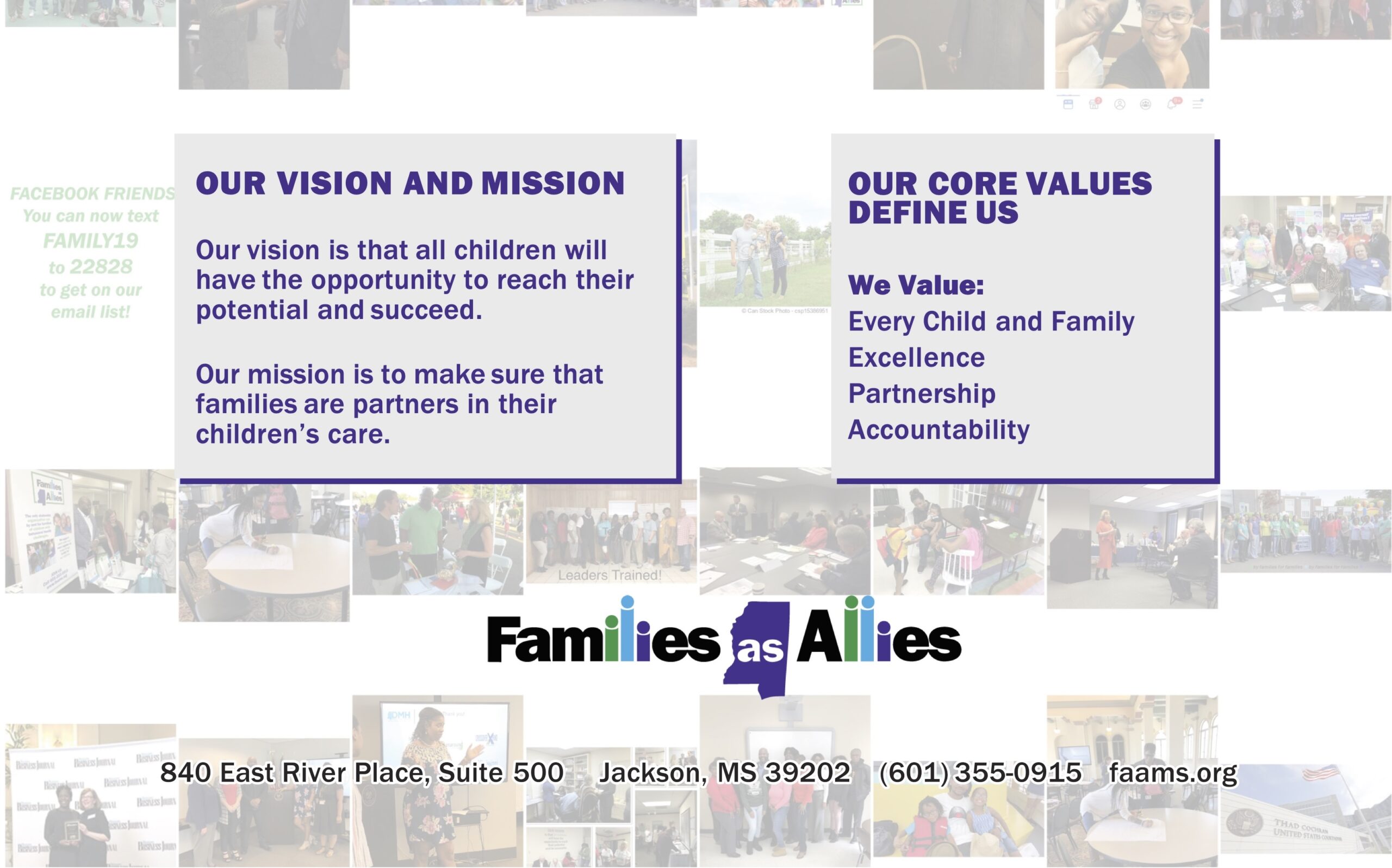This week, we want to bring bills to your attention that are currently alive in the Mississippi Legislature and that we are examining in light of our mission and core values.
Families as Allies’ mission is: “Families are partners in their children’s care.” By this, we mean that Mississippi’s system of care for children shall be family-driven. (This same language is in state law regarding the system of care for children’s mental health.)
“Family-driven” means “families have the primary role in decisions regarding their children as well as the policies and procedures governing the well-being of all children in their community, state, tribe, territory and nation. This primary role includes but is not limited to:
- Identifying their strengths, challenges, desired outcomes/goals, and the steps needed to achieve those outcomes/goals;
- Designing, implementing, monitoring, and evaluating services, supports, programs, and systems;
- Choosing supports, services, and providers who are culturally and linguistically responsive and aware; and
- Partnering in decision-making at all levels.
Two of the nine guiding values for achieving family-driven practice are:
- “Families and family-run organizations provide direction for policy decisions that impact funding, supports, and services, including the right of families and youth to have a meaningful voice at the individual and policy level.”
- “Providers, agencies, and systems take the initiative to change policy and practice from provider-driven to family-driven.”
SB 2597 directs the state Departments of Mental Health and Education to work together on recommendations from last year’s K- 12 Mental Health Task Force. Joy Hogge, executive director of Families as Allies, was on the Task Force and repeatedly urged that its recommendations be implemented through the Interagency Coordinating Council for Children and Youth (ICCCY) because the ICCCY includes families, representatives of systems and other relevant stakeholders. So, we appreciate this bill focuses on the ICCCY rather than creating another task force or committee.
We are alarmed, though, that SB 2597 also creates an executive committee of the ICCCY comprised solely of heads of state agencies. This committee excludes families and the family-run organizations mandated to be on the ICCCY. It also sets up an infrastructure for the executive committee to become the de facto decision-making body for the ICCCY.
We believe that this executive committee, as currently organized, is not consistent with the definition of family-driven practice or Mississippi law. If legislators want this bill to move forward, we urge them to amend the bill by either (a.) assigning the current executive committee tasks to the entire ICCCY and deleting the executive committee or (b.) adding the family-run organizations that are ICCCY members to the executive committee.
Families as Allies’ core values are “every child and family,” “excellence,” “partnership,” and “accountability.” We are concerned that two bills could remove accountability checks on the state mental health system. SB 2889 eliminates the position of Coordinator of Mental Health Accessibility. The coordinator monitors outcomes of the overall mental health system and is, as far as we know, the only person or entity in the state with the authority to monitor the activities and outcomes of the Mississippi Department of Mental Health (DMH). The coordinator’s office also publishes updates and reports about the state mental health system. The coordinator’s most recent report is in our resource section this week. We are attempting to learn what led to this bill and will share any information with you.
We are puzzled by HB 589 and plan to clarify if it lengthens current terms for State Board of Mental Health members and/or removes Senate confirmation requirements for board members or the executive director of the DMH. These actions could make the positions less accountable to service recipients, outside authorities and taxpayers. We will share with you what we learn about this bill.
Last week, we shared with you this list of bills we are following that survived the first committee deadline. We also explained that legislators must vote on these bills by Thursday, February 13, or they will die. Please see our 2/6/2025 legislative update for more information about these bills and how to contact your legislators if you want to talk to them.
Please let us know if you have any questions or responses to our legislative updates. We want them to be helpful to you and your family, and we also want to learn from you if you have additional information or see things differently than we do.

